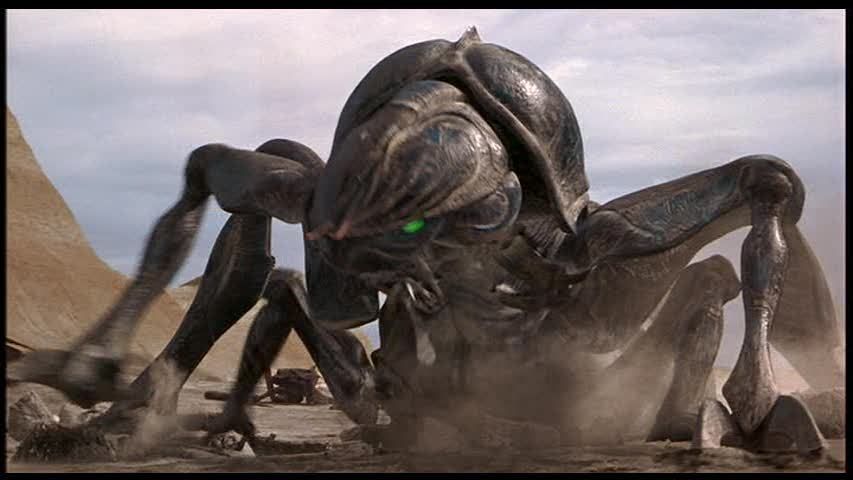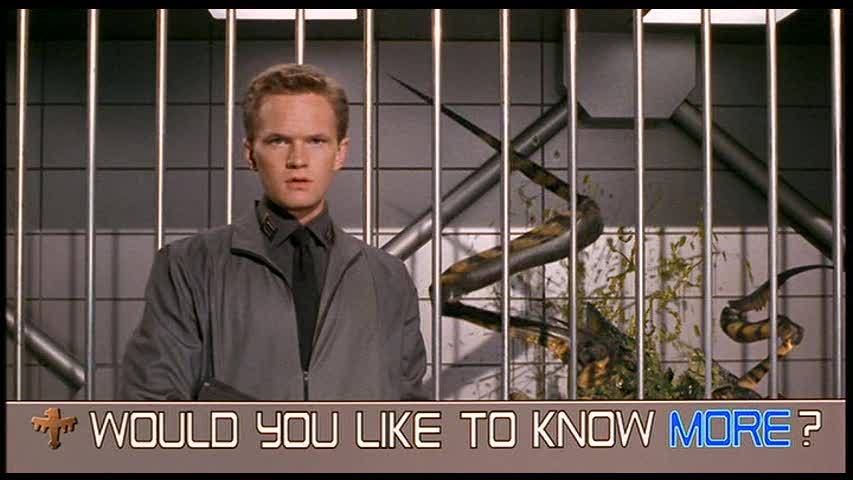
Starship Troopers is at once a thrilling, ultra-violent, energetically paced sci-fi action flick, and a viciously clever, uncompromising satire of exactly the kind of movie it purports to be, and of the militaristic, proto-fascist attitudes and assumptions underlying such films. It's the story of a war between an intelligent alien species of bugs and a human society of the future, when the world has been united under an international government in which citizenship is not assumed but granted only to those who earn it by serving in the military. The nature of this society is never thoroughly explored in the film, which instead focuses on the military itself, but director Paul Verhoeven makes it very easy to read between the lines and imagine the kind of society he's depicting here. It's a totalitarian world government with an iron grip on the media, which is used as a tool of indoctrination, encouraging military service and vilifying the enemy bugs to the extent that kids on earth senselessly stamp out harmless cockroaches as their mother enthusiastically cheers them on. The military leaders are the only figures of authority shown in the film, suggesting that the military and government are closely related if not interchangeable. And the leaders take no real responsibility for their actions; after a particularly grave military disaster, the "sky marshall" who had been in charge makes a show of calmly stepping aside, ushering in his replacement and then standing behind her on the podium as she delivers the newest commands. It's as much of a blatant mockery as the reasons for the war in the first place: the media continually blames the alien bugs on their distant planets for sending meteors towards Earth, but this never makes much sense even if the film neither explains nor explicitly questions it. The absurdities peddled by the media and the government are simply allowed to stand, their ridiculous contradictions and blatant non-sequiturs obvious to anyone who looks.
The government's enthusiastic propaganda for military service — and the extra rights and privileges granted to those who serve and thereby become "citizens" — makes many youths willing slaves ready to feed themselves into what one army recruiter half-jokingly calls "the meat grinder." He immediately retracts his jest, though, proudly announcing that the army made him into the man he is today: a man missing both legs and one arm, as it turns out. Still, kids join up for a variety of reasons, many of them familiar from our own armies (poverty, lack of options, the desire for a college scholarship), and some predicated on this future government's increasing stranglehold on the lives of its people (one young woman says she enlisted because it's easier for citizens to get permission to have children).
Among these new recruits, a quartet of friends are sent to vastly different fates within the military apparatus: brainy psychic Carl (Neil Patrick Harris) becomes a military intelligence officer; brash, talented, ambitious Carmen (Denise Richards) is sent to pilot training; and the slow-witted but earnest Johnny Rico (Casper Van Dien), who enlisted only for his love of Carmen, is sent to be a lowly grunt in the mobile infantry, where he's joined by Dizzy (Dina Meyer), who just wants to be close to Johnny. The film follows these friends through the initial stages of the war against the bugs. Verhoeven deliberately populates the film with mannequin-pretty young actors who go, glassy-eyed and uncomprehending, into the maw of an industrial machine that churns them out like bloody meat. None of them know why they're fighting these bugs, beyond the fact that they're blamed for meteor showers, but they nevertheless charge into action without hesitation.

And there's certainly plenty of action. The film is swarming with fierce, terrifying bug creatures. There's surely a lot of CGI at work here, but these aliens feel real and physically tangible when it counts; the close encounters with the bugs have a messy, sticky, gory emphasis on viscera and bug-goo that is reminiscent of the best of David Cronenberg's body-horror special effects. Verhoeven focuses equally on the casualties of humans and aliens alike; neither is spared horrible, bloody deaths in which limbs are shredded apart and hacked off, and blood sprayed everywhere. The human carnage is often harrowing (though in its aftermath, the dead strewn around frequently look more like discarded crash test dummies than real corpses), but the deaths of the aliens are often felt less intensely, since the obvious impulse is to root for the humans.
Still, Verhoeven keeps subtly reminding his audience that the aliens are not simply expendable cannon fodder: a bombing raid on their planet emphasizes the way huge swaths of the creatures, who are seemingly doing nothing aggressive for once, are simply obliterated by the waves of fire. It's the bug equivalent of a civilian massacre, and Verhoeven's composition deliberately recalls popular representations of the Pearl Harbor attack and of American napalm bombing raids in Vietnam. The bugs also cease being quite so intimidating in the film's increasingly lurid final sequence, in which the troops are tracking what's known as the "brain bug," the central intelligence driving the creatures. This turns out to be a massive, nearly immobile lump with a nakedly vaginal face, a row of curiously soulful black eyes surrounding its labial, muscus-squirting mouth. Once the troops capture this creature, Carl reads its thoughts, triumphantly declaring that "it's scared" to the cheers of the soldiers, who rejoice at the revelation that their enemy can feel emotions, and that they've frightened it. Finally, the scientists who study this captured bug complete the vaginal metaphor by inserting metallic probes into the creature's mouth, accompanied in the media propaganda by censorial black bars, a subtle joke that links top-secret military intelligence and low-grade smut. The victors complete their victory by literally fucking the enemy, a final act that definitively establishes Verhoeven's sympathy for the bugs rather than humans. At the same time, the human specificity of the film's actual protagonists is de-emphasized, not only by the wooden acting but by the way that human life is so casually expended in pointless battles. At one point, the military commanders knowingly send a small group of soldiers onto a planet where they're pretty sure the troops will be slaughtered — "that mission had a very low probability of survival" is the euphemistic explanation — just to prove a theory. The film is all about the low value of life in militaristic and totalitarian society, and the high costs of pointless wars fought by a docile, brainwashed populace.
This was a terribly underappreciated film, lost in the sign of its times. It proves to be prescient when one watches it now, a different time from the nineties, when it's perfectly obvious for Aranofky to remake Robocop. Great review.
ReplyDeleteYeah, I always really dug this film and appreciated how Verhoeven basically took a bunch of BEVERLY HILLS 90210/WB pretty-boy/girl actors and dropped them into a CGI meat-grinder. It's weird how a lot of people seemed to miss the actual message of the film but I suppose that is its brilliance. It works on multiple levels - it can be enjoyed as a rock 'em, sock 'em action-fest and as a darkly satirical commentary on fascism.
ReplyDeleteExcellent review.
ReplyDeleteI believe there's also the quiet one-line revelation at some point in the film that the humans actually instigated the war with the bugs. If that's the case, then this movie bears even more relevance with current events.
Terrific review!
ReplyDeleteI too really liked the movie - Verhoeven's sheer audacity in making an ultra-violent, seemingly brainless, pulp movie. The execution, too, is brilliant - the kinetic narrative, the superb special effects, and as you've detailed in your review, the socio-political and satirical undertones. In the hands of a lesser director the movie was fodder for B-grade crap; however, Verhoeven has made it not just an immensely engaging movie, but also a work worth contemplating on.
Thanks for the comments, all. I'm glad to see that so many appreciate Verhoeven's sly satire.
ReplyDeleteTony, I don't remember a specific line about the humans starting the war (I may have missed it, though). But I do think it's kind of obvious that the meteor that destroys Buenos Aires is merely a pretext for attacking the bugs. There's nothing in the film to suggest that the bugs are actually able to direct meteors and send them out to hit the Earth; they seem to have no technology and all of their "weapons" are biological components of their bodies, like the bugs who poop out those giant electrical rockets. It seems much more likely that the human government is blaming natural disasters on the "enemy" -- as if Bush had used Hurricane Katrina as an excuse to invade Iran. Verhoeven is great at including stuff like this between the lines; the film itself never explicitly questions the humans' rationale for war, but he makes sure that the evidence is there for those who want to judge for themselves.
I have read the book and understand all of the subtext within this film, but my enjoyment of it is strictly on a fun science fiction level. And it is definitely one of my favorite science fiction movies. The landing page "would you like to know more" is a brilliant narrative.
ReplyDeleteThe book is much more hard-hitting in its shots at our military mentality. Early in the book, the troops randomly hit some planet and destroy all the creatures within a city. Not because they had to, but because they wanted to remind them who the superior power was. It's a very short piece in the book, but it said a lot. I wish they would have included that scene in the movie.
An excellent piece on a really great film! It felt to me that we were seeing the bugs humanised at the same time as we were seeing the humans becoming like swarms of bugs. The final scenes are most clearly show this turnaround where we start seeing individual bugs and the human characters we've cared for get lost among all the other armour wearing soldiers. There are corollaries between the characters and their opposite insect number - Neil Patrick Harris (in his SS style uniform!) is the human equivalent of the 'brain bug'.
ReplyDeleteI don't think we ever really see the human characters as any more than ciphers - their individuality is expressed in the most mundane ways. Even before their are inducted into the culture of war they all have their manufactured niches in high school (the jock, the nerd, the beautiful girl, the ambitious smart girl and so on). Their characters are so instantly graspable with no trace of quirks that might make them stand out from the norm that this even more clearly makes the film a kind of propaganda film for the war. One of the amazing/scary things about the film is that I found myself getting caught up in the action, rooting for our heroes to "kill 'em all". Again like the bugs either it is the faceless, unintroduced waves of soldiers being cut down and dying horribly or it is those characters who have a dramatically necessary reason for dying and by doing so have an impact on our main characters (Dizzy and Michael Ironside's teacher and so on).
Even Johnny's parents are set up (by this hypothetical pro-bug war filmmaker) to be loving but totally opposed to their son joining the military. They are then given their comeuppance by dying horribly, therefore giving our hero more motivation to become a military hero than they did when they were alive!